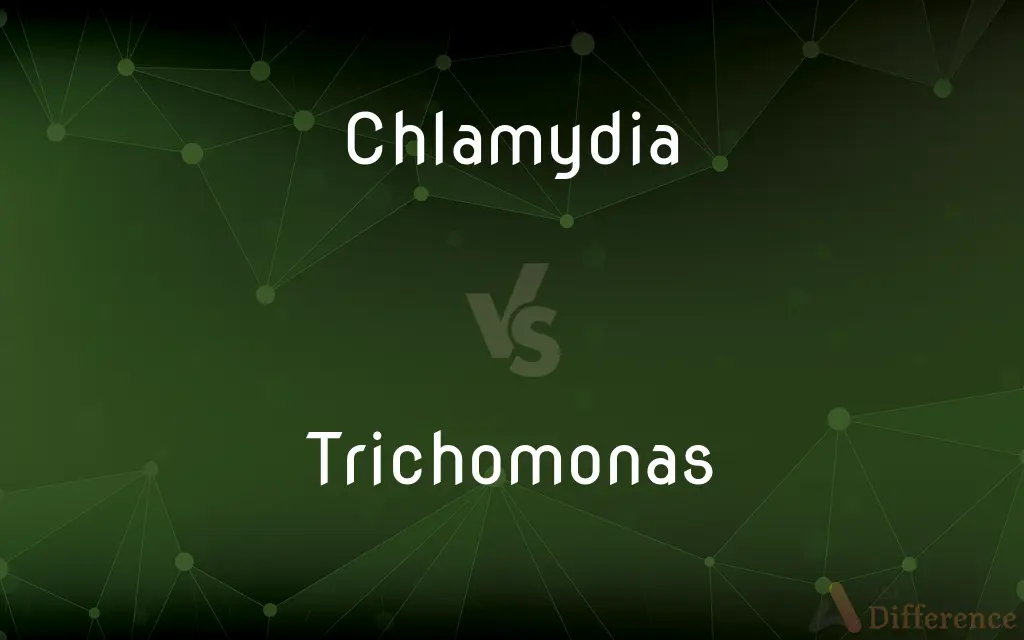Chlamydia vs. Trichomonas — What's the Difference?
Edited by Tayyaba Rehman — By Fiza Rafique — Updated on September 29, 2023
Chlamydia is a bacterial infection, often sexually transmitted, while Trichomonas is a protozoan parasite causing a sexually transmitted infection.

Difference Between Chlamydia and Trichomonas
Table of Contents
ADVERTISEMENT
Key Differences
Chlamydia and Trichomonas are both commonly associated with sexually transmitted infections, but they are fundamentally different in nature. Chlamydia is a bacterial infection, whereas Trichomonas is caused by a single-celled protozoan parasite.
The symptoms produced by Chlamydia can be subtle, often leading it to be dubbed the "silent infection." On the other hand, Trichomonas can cause a foul-smelling vaginal discharge, itching, and painful urination in women, though men often remain asymptomatic.
Diagnosing both conditions requires specific tests. For Chlamydia, a nucleic acid amplification test is often used. In contrast, Trichomonas can often be diagnosed through a wet mount microscopic examination, though nucleic acid tests are also available.
Treatment differs for these infections. Chlamydia is typically treated with antibiotics like azithromycin or doxycycline. Trichomonas, being a protozoan infection, is commonly treated with the antiprotozoal drug metronidazole or tinidazole.
Both Chlamydia and Trichomonas can increase the risk of acquiring other sexually transmitted infections. Additionally, untreated Chlamydia can lead to complications like pelvic inflammatory disease, while Trichomonas can increase the risk of premature births in pregnant women.
ADVERTISEMENT
Comparison Chart
Type
Bacterial infection
Protozoan infection
Common Symptoms
Often subtle or asymptomatic
Vaginal discharge, itching, painful urination
Diagnostic Method
Nucleic acid amplification test
Wet mount microscopy, nucleic acid test
Treatment
Antibiotics (e.g., azithromycin)
Antiprotozoal (e.g., metronidazole)
Potential Complications
Pelvic inflammatory disease
Increased risk of premature birth
Compare with Definitions
Chlamydia
Can lead to serious reproductive complications.
If left untreated, Chlamydia can cause infertility.
Trichomonas
Causes symptoms primarily in women.
Men often don't show symptoms of Trichomonas but can still spread it.
Chlamydia
Treated with specific antibiotics.
Timely treatment can effectively cure Chlamydia.
Trichomonas
Can lead to complications in pregnancy.
Pregnant women with Trichomonas have a higher risk of premature delivery.
Chlamydia
A bacterial sexually transmitted infection.
Many people are unaware they have Chlamydia due to its subtle symptoms.
Trichomonas
A protozoan sexually transmitted infection.
Trichomonas is one of the most common STIs worldwide.
Chlamydia
Often referred to as the "silent infection."
It's crucial to get tested as Chlamydia can be asymptomatic.
Trichomonas
Often detected via wet mount microscopy.
For a Trichomonas diagnosis, a sample is often examined under a microscope.
Chlamydia
Can increase the risk of other STIs.
Having Chlamydia makes individuals more susceptible to other infections.
Trichomonas
Treated with antiprotozoal medication.
The drug metronidazole is effective against Trichomonas.
Chlamydia
Chlamydia, or more specifically a chlamydia infection, is a sexually transmitted infection caused by the bacterium Chlamydia trachomatis. Most people who are infected have no symptoms.
Trichomonas
Trichomonas is a genus of anaerobic excavate parasites of vertebrates. It was first discovered by Alfred François Donné in 1836 when he found these parasites in the pus of a patient suffering from vaginitis, an inflammation of the vagina.
Chlamydia
Any of various gram-negative, coccoid bacteria of the genus Chlamydia, especially C. psittaci and C. trachomatis, that are pathogenic to humans and other animals, causing infections such as conjunctivitis in cattle and sheep and trachoma, urethritis, and pneumonia in humans.
Trichomonas
Trichomonad
Chlamydia
Any of several common, often asymptomatic, sexually transmitted diseases caused by the bacterium Chlamydia trachomatis.
Chlamydia
(uncountable) Any of several common, often asymptomatic, sexually transmitted diseases caused by the microorganism Chlamydia trachomatis.
Chlamydia
(countable) Any of various coccoid microorganisms of the genus Chlamydia that are pathogenic to humans and other animals.
Chlamydia
A coccoid rickettsia which may infect birds and mammals; it causes infections of eyes and lungs and the genitourinary tract.
Chlamydia
A sexually transmitted infection caused by bacteria of the genus Chlamydia
Chlamydia
Coccoid rickettsia infesting birds and mammals; cause infections of eyes and lungs and genitourinary tract
Common Curiosities
Which infection is known as the "silent infection"?
Chlamydia is often dubbed the "silent infection."
Can Trichomonas affect pregnancy?
Yes, Trichomonas can increase the risk of premature birth.
Is Chlamydia caused by bacteria or a parasite?
Chlamydia is caused by bacteria.
How is Chlamydia typically treated?
Chlamydia is typically treated with antibiotics.
Which infection often presents with foul-smelling vaginal discharge?
Trichomonas often causes a foul-smelling vaginal discharge.
What microorganism causes Trichomonas?
Trichomonas is caused by a protozoan parasite.
Is it possible to have both Chlamydia and Trichomonas simultaneously?
Yes, it's possible to be co-infected with both Chlamydia and Trichomonas.
Can Chlamydia lead to infertility?
Yes, untreated Chlamydia can lead to reproductive complications, including infertility.
What is the primary diagnostic method for Trichomonas?
Trichomonas is often diagnosed using wet mount microscopy.
Which infection can be treated with metronidazole?
Trichomonas is commonly treated with metronidazole.
Share Your Discovery

Previous Comparison
Paycheck vs. Payslip
Next Comparison
Ares vs. AriesAuthor Spotlight
Written by
Fiza RafiqueFiza Rafique is a skilled content writer at AskDifference.com, where she meticulously refines and enhances written pieces. Drawing from her vast editorial expertise, Fiza ensures clarity, accuracy, and precision in every article. Passionate about language, she continually seeks to elevate the quality of content for readers worldwide.
Edited by
Tayyaba RehmanTayyaba Rehman is a distinguished writer, currently serving as a primary contributor to askdifference.com. As a researcher in semantics and etymology, Tayyaba's passion for the complexity of languages and their distinctions has found a perfect home on the platform. Tayyaba delves into the intricacies of language, distinguishing between commonly confused words and phrases, thereby providing clarity for readers worldwide.














































